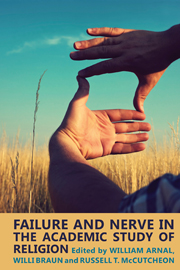Book contents
- Frontmatter
- Content
- Preface
- Acknowledgments
- Contributors
- Epigraph
- The Nerve of Donald Wiebe
- The Failure of Nerve in the Academic Study of Religion
- General Failures
- Catching Up with Marx: Truth, Myth, and the Niceties of “Belief”
- Fixed Geomorphologies and the Shifting Sands of Time
- A Critical History of Religion as a Psychological Phenomenon
- Everything Old Is New Again
- Revisiting the Confessional: Donald Wiebe's “Small ‘c’ Confessional,” Its Historical Entailments and Linguistic Entanglements
- Special Failures
- In Lieu of Conclusion
- Index of Authors
Catching Up with Marx: Truth, Myth, and the Niceties of “Belief”
from General Failures
- Frontmatter
- Content
- Preface
- Acknowledgments
- Contributors
- Epigraph
- The Nerve of Donald Wiebe
- The Failure of Nerve in the Academic Study of Religion
- General Failures
- Catching Up with Marx: Truth, Myth, and the Niceties of “Belief”
- Fixed Geomorphologies and the Shifting Sands of Time
- A Critical History of Religion as a Psychological Phenomenon
- Everything Old Is New Again
- Revisiting the Confessional: Donald Wiebe's “Small ‘c’ Confessional,” Its Historical Entailments and Linguistic Entanglements
- Special Failures
- In Lieu of Conclusion
- Index of Authors
Summary
If there is anything that unites the hopelessly disjointed field of religious studies, it is the methodological practice of suspending or “bracketing” the epistemic desire to evaluate a given community's claims about the world. According to Jacques Waardenburg, for example, “the study of religion modestly puts the question of the ultimate truth of these religions between brackets (epoché)” (2000: 107). Nevertheless, Don Wiebe has argued for nearly thirty years that the academic study of religion must abandon its strategic hedging about such matters and confront the question of truth headon. His conviction is that a genuinely “critical” or “scientific” study of religion—a distinction that he never quite makes clear—is impossible so long as we shy away from asking: Is any of the stuff that these people say true? Wiebe insists that until we stop bracketing this frankly philosophical issue, scholars of religion will be damned to a dismal choice between flaccid reportage and covert apologetics. As he makes the case in Religion and Truth: “The scientific study of religion insofar as it seeks an explanation of the phenomena it scrutinizes, far from resting on the distinction between ‘the truth about religion’ and ‘the truth of religion,’ precludes it” (1981: 3). One might say that Wiebe has been proposing a sort of professional methodological addendum to Alexander Kinglake's cheeky suggestion that plaques with the legend Important If True should be posted over the door of every church, synagogue, mosque and temple.
- Type
- Chapter
- Information
- Failure and Nerve in the Academic Study of Religion , pp. 34 - 49Publisher: Acumen PublishingPrint publication year: 2012

